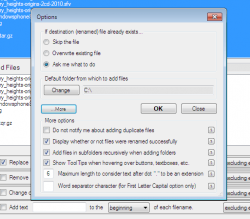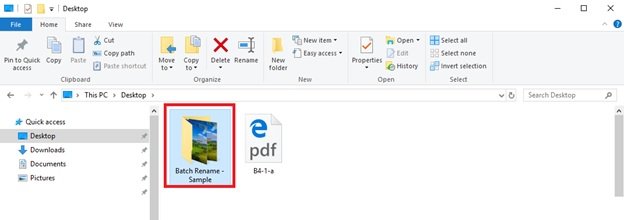

- #Batch file rename remove last character how to#
- #Batch file rename remove last character plus#
- #Batch file rename remove last character free#
#Batch file rename remove last character plus#
All of that plus being able to use Regex to build very complicated renames. Im looking for a program or CLI command for removing the X last characters from the filename.
#Batch file rename remove last character how to#
As you may know, yt-dl will append the view code to the file name. How to batch rename and remove last characters, If your file names do not contain any periods other than at the end (.doc.pdf), the following will work: for /f delims. Once of the many things that makes using a tool like Name Mangler valuable is that you can undo your changes, view a history of your changes, and create a "droplet" that make running the name change on other files really convenient. Im trying to rename a lot of videos downloaded via youtube-dl from various sources. Under "Replace with" enter the character you want to replace "

#Batch file rename remove last character free#
There are free options out there, but Name Mangler offers a ton of features that make it well worth the $19.00 to me. Look at the file again, and when you are positive that it's what you want, execute it with sh /tmp/bulk-rename.I use Name Mangler 3 for file and folder renaming. That file now contains a lot of lines like mv -n "foo" "bar" I guess I had to add a character to JDobbsy1987's -11 in order to account for the quotation mark I'd added, though I'm not sure why that doesn't let the space cause problems again. mv -n prevents overwriting an existing file. Edit: a little research tells me that the 0,-12 bit is a modifier that strips the last n characters (in this case, n12) from a string. The sed part adds a mv -n to the start of each of those lines. The example bash script code uses shell parameter expansion to slice and dice the fully qualified pathname of the file(s) passed to it into the necessary pieces and then renames the file(s) using the mv command with the -n option, which will not overwrite an existing file, based on the values of the sliced and diced pieces of the fully. What that paste command does is it takes one line from /tmp/old.txt and one line from /tmp/new.txt and puts them together on one single line with a blank between them. dxg file-name-.mov -> file-name.mov file-name. Code: Select all filename.jpeg filename-.png -> filename.png file name.doc file name 3.mp4 file name -.dxg -> file name. Then put the files together with the paste command and change each line to a mv command: paste /tmp/old.txt /tmp/new.txt | sed -e 's/^/mv -n /' >/tmp/bulk-rename I'm trying to remove the last character of a filename but only if it matches a hyphon, eg.

In any case, have a good hard look at /tmp/new.txt to see if it's really what you want the new names to look like.Ĭheck for duplicate names! ( sort /tmp/new.txt | uniq -r) Make sure there are no duplicates and if there are, edit that line manually to get a unique name. Important: do not change the order in that file, and do not delete or add any line! The above command will rename the file name TESTA.txt to TESTB.txt. Note The quotation marks in the command are only required if the name includes spaces. Then replace unwanted characters in /tmp/new.txt, either manually with an editor or with sed -i -e (or perl -p -i -e if you prefer that) or tr or tr -d. Navigate to your path where you need to rename the file by type cd and the path. it will give you "foo*bar" or "foo | bar". Ls -Q will add double quotes around each name, i.e. In general, mmv is great at mass-renaming tasks.īut in this particular case, I'd go a completely different route: Generate a shell script with a couple of shell commands, have a close look at it if it's really what I want, and then execute it.


 0 kommentar(er)
0 kommentar(er)
